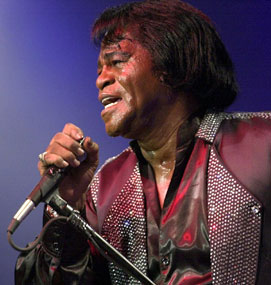- James Brown – The Godfather of Soul (Official Site)

(FinalCall.com) – James Brown, one of the most important influences on American Culture and Black Culture—died Dec. 25 at Emory Crawford Hospital in Atlanta. He was 73.
“The Dynamic Mr. Please, Please, Please, whose million seller-hits include ‘Say It Loud, I’m Black and I’m Proud,’ and ‘Don’t Be A Dropout.’” was affectionately known as “The Hardest Working Man in Show Business.”
He had a revolutionary influence on Black culture, at the height of the Civil Rights Movement and beyond. His 1969 recording, “Say It Loud, I’m Black And I’m Proud” is still regarded as a Black anthem today. “I clearly remember we were calling ourselves ‘Colored,’ and after the song, we were calling ourselves Black,” Mr. Brown said in a 2003 interview. “The song showed even people to that day that lyrics and music and a song can change society.”
His music, his message and his dancing all added to his appeal. His on-stage theatrics including being draped with a cape after falling to his knees, as well as his band—The Famous Flames—were arguably the tightest and most rhythmic band during the last 40 years of the 20th Century. “To this day, there has been no one near as funky. No one’s coming even close,” said Chuck D of Public Enemy told The Associated Press, according to a published report.
“Not only his fans, but I think the world will miss him,” Mustapha Muhammad (Charles Bobbit), Mr. Brown’s personal manager for the last 39 years told The Final Call. “He wasn’t just an entertainer, he was a world entertainer. He was one of the greatest, if not the greatest showmen that ever was, in what he does: Funk Music,” said Mr. Muhammad.
His music was distinctive and enormously popular.
“He changed music around,” Mr. Muhammad continued. “He changed the beat of the music, with his song, ‘Papa’s Got A Brand New Bag.’”
Mr. Brown’s popular hit singles include such classics as “Try Me,” “Out of Sight,” “I Feel Good,” “Get On The Good Foot,” “Cold Sweat,” “Mother Popcorn,” and “The Payback.”
Mr. Brown believed his enormous popularity with Blacks was because: “He said, he stayed in the pulse of the people,” said Mr. Muhammad. “When you listen to his music, your foot will pat, whether you pat it or not. And Black people, or grassroots people, or whatever you want to call it, are very rhythmic. They are rhythm itself. He stayed with a beat, not a primitive beat, but a beat that will make them move. Later the Whites got it. But people of color loved his music because it made you want to move, made you want to dance.”
James Brown had a rigid work ethic and demand for perfection from his band-members. He even inspired a trading stamp, the Black & Brown Stamp Co. in the San Francisco Bay Area, in the late 1960s. Stores gave the trading stamps, which featured Mr. Brown’s picture, to customers to redeem later for prizes.
In the 1960s, Mr. Brown promoted Black consciousness in his music and lived it by example, even abandoning “conked” hair, adopting an “Afro” hairstyle. “He believed in education and he made message songs, you can go back to 1955 and 1953 and listen to his songs now, and you’ll get a message from them,” said Mr. Muhammad.
“He always made message songs, like ‘I Don’t Want Nobody to Give Me Nothin’, Just Open Up The Door, I’ll Get It Myself.’ Mr. Brown was a very proudman. And that revolution of the mind, it always had to do with something to make you think.
“But I’ll tell you something,” said Mr. Muhammad, recalling a recent flight with Mr. Brown from London to the U.S., “three weeks ago he told me, ‘Mr. Bobbit, we’ll be going up to Chicago soon. I’m ready to sit down with the Minister (Louis Farrakhan). I’m ready to sit down with him because he’s got a good program.
“(Mr. Brown) just did not live long enough to do it. But he always said that the message was correct. I know he respected the Honorable Elijah Muhammad, and he said that he had a good program.
“I want Mr. Brown to be remembered as a great person. They always asked him, ‘How do you want to be remembered?’ And he always said he wants to be remembered as someone who contributed a little, to help a lot,” said Mr. Muhammad.
“He’s what Michael Jackson, Prince and even Mick Jagger aspired to be on stage,” said Nelson George, a music producer and cultural critic and author of “The Death of Rhythm & Blues,” according to a published report. “The Ushers and Justin Timberlakes of today are in his debt as well. Also there is no hip hop without James Brown. Period. The instrumental grooves, the funky drummer, the cocky attitude, the sex machine swagger, the egotistical lyrics–he created the blueprint for everyone on the mic. We lost a great man on earth and just got a new soulful star in the sky,” said Mr. George.












